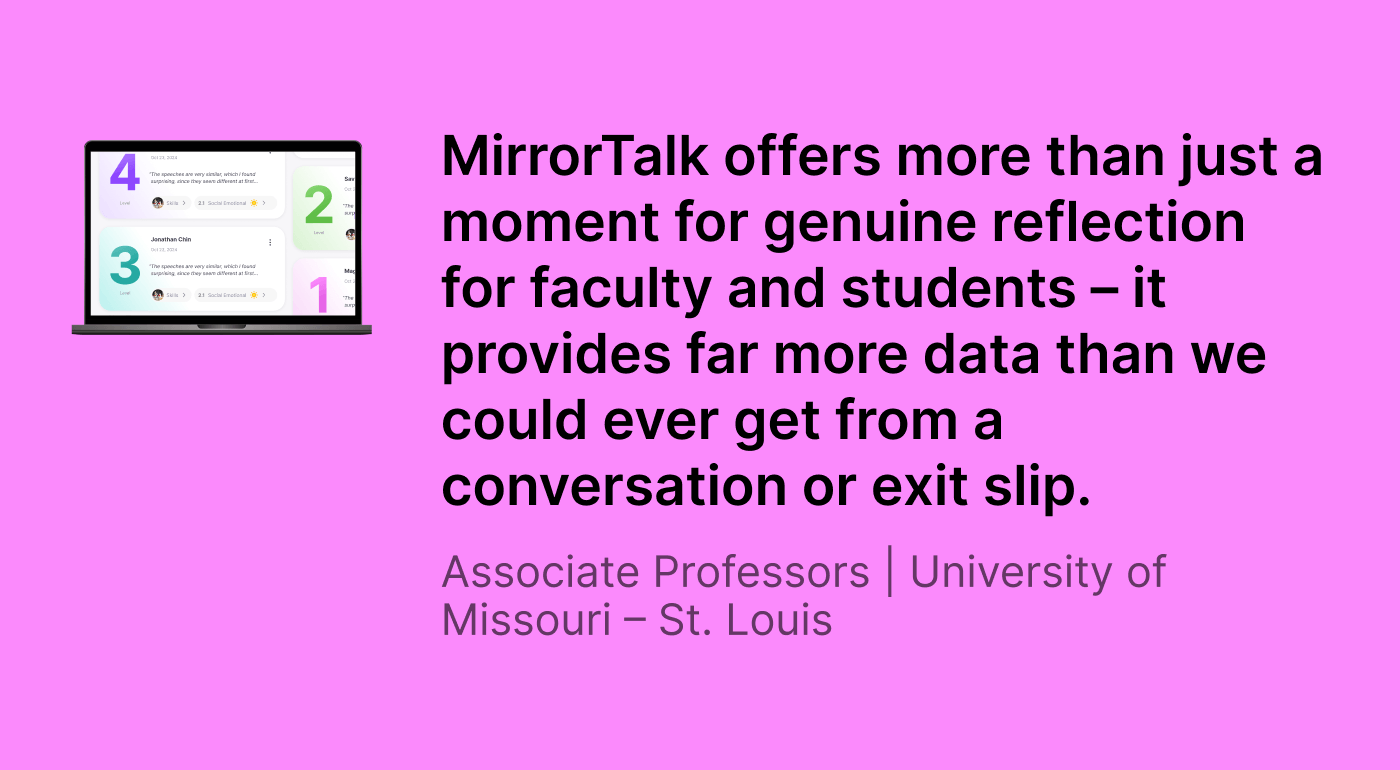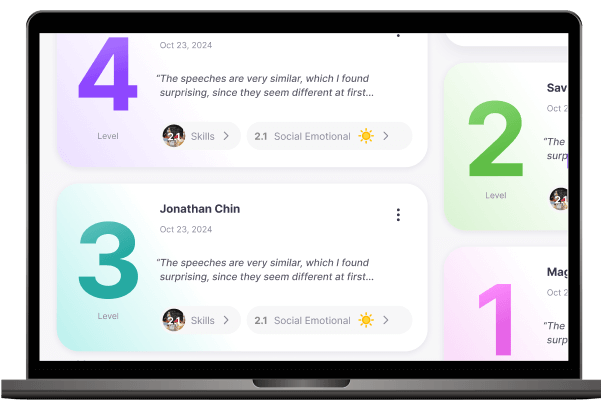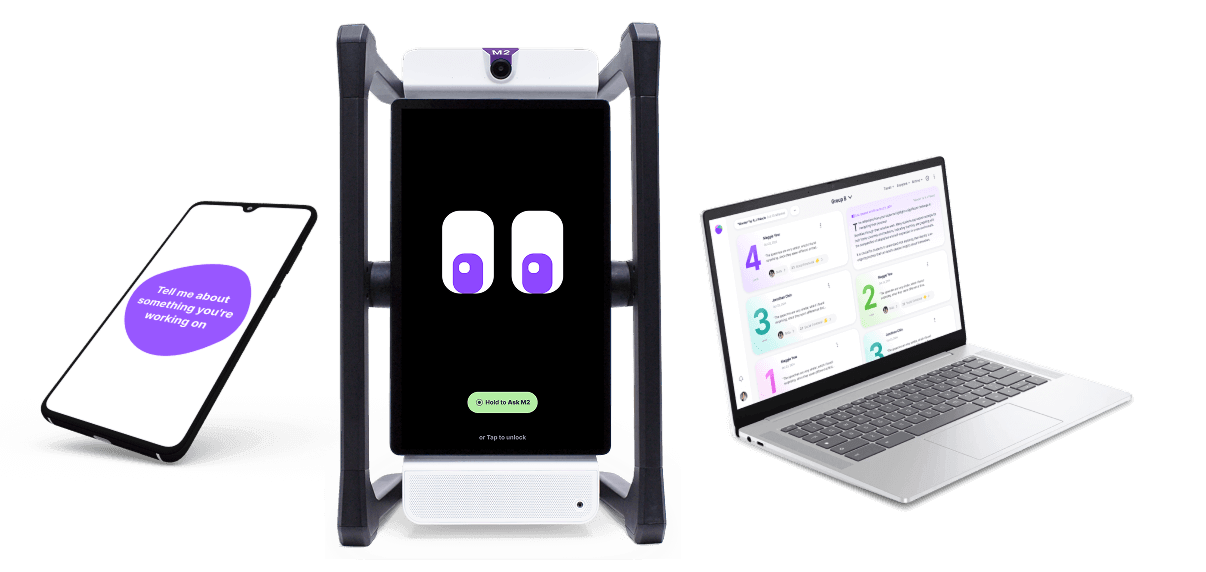

Everyone loved seeing the AI summary of their reflection data and appreciated the authentic feedback. MirrorTalk offers more than just a moment for genuine reflection for faculty and students – it provides far more data than we could ever get from a conversation or exit slip.
Associate Professors | University of Missouri – St. Louis
USE CASE
Multi-functional reflection and data collection across a college of education
Natalie Bolton, Phyllis Balcerzak, Kristen Johnson
Associate Professors
School/District:
University of Missouri – St. Louis
Grade Level Adult/Higher Ed
The University of Missouri-St. Louis (UMSL) College of Education faced various challenges in collecting meaningful data and facilitating genuine reflection across different educational contexts. Three key figures – Natalie Bolton, Ph.D., an associate professor in Educational Leadership and Preparation; Phyllis Balcerzak, Ph.D., an associate professor in STEM pedagogy; and Kristen Taylor, Ph.D., a part-time clinical educator – each grappled with unique pain points in their respective roles. From ineffective faculty professional development reflections to limited student engagement data in STEM summer camps, and superficial pre-service teaching evaluations, these educators sought a solution to enhance their assessment and feedback processes.
Faculty gets the same authentic feedback they give their student teachers
Before implementing MirrorTalk, Natalie struggled to inspire authentic reflection during faculty professional development seminars and workshops. She relies on this feedback to inform the efficacy of grant programs that fund myriad projects around the College of Education. Traditional methods via form or 1:1 conversations often led to contrived responses, leaving professors feeling judged or pressured to provide answers they thought Natalie was seeking. Natalie observed, “In our 1:1s, I might have gotten similar responses to MirrorTalk, but I also think not being physically present to probe them or inadvertently give them nonverbal queues lets them express themselves more fully.”
With MirrorTalk, Faculty can now reflect in a judgment-free zone, either on-site with M2 or on their own time using their own devices. Natalie noted the immediate impact: “Everyone loved seeing the AI summary of their reflection data. They appreciated the authentic feedback in different categories like mindset, bias, and cognitive abilities, which showed how they speak, reflect, and the depth of their insights. It’s exciting because it offers a moment for genuine reflection, more detailed than a conversation or quick exit slip.”
With MirrorTalk, Natalie can confidently glean candid and transparent feedback from professors about the true efficacy of their projects and ensure satisfaction among colleagues across the entire department.
Measuring engagement without adding to a teacher’s plate
Dr. Phyllis Balcerzak was facing challenges in gathering meaningful engagement data from the College of Education’s STEM summer program for middle school students. The Qualtrix survey she administered in the past was not engaging for the students and provided limited insights. With MirrorTalk, Phyllis explained, “I can finally figure out the right metrics for engagement – we can’t get that in writing through their survey responses.”
With MirrorTalk, Phyllis gained access to richer reflection data that went beyond just understanding and satisfaction. The technology provided key metrics on each student’s ability, zone, mindset, and motivation as they completed their labs in the summer program. This comprehensive data helped Phyllis prioritize the most effective aspects of the program for future participants.
Additionally, incorporating guided activities with M2’s Workspace allowed for more autonomous learning during her camp. Phyllis noted, “Workspaces are a great way to let students actually catch up at a center by themselves or with a group, and you’ll still get all of these wonderful insights into how well the assignment went.”
Phyllis witnessed the potential for Workspaces to support differentiated instruction and help chronically absent students in traditional K12 environments. She posits “With a guided activity like this, teachers don’t have to keep repeating the same safety procedures or something of the like for a lab. It can just be embedded in the first step of every activity. This approach could help teachers meet students where they are with minimal lift and truly help them get caught up to speed.”
Master’s students make better connections between practice and execution
Dr. Kristen Taylor supports provisionally certified teachers in the university’s master’s program but lamented that reflection activities she carefully placed at the beginning, during, and end of course were often treated as mere checkboxes, noting her student teachers’ responses lacked depth and authenticity. As Kristen notes often, “Sometimes people don’t reflect and they’re just kind of treating it as – I’m going to submit this assignment, I’m going to do this, and it’ll be done.” Her written, virtual method was time-consuming and ineffective for her students who faced taxing schedules and received limited face-to-face interactions with Kristen throughout the semester.
After having students reflect with MirrorTalk, Kristen found a more engaging and authentic way for them to reflect on their teaching practice. “It allows us to really get into their heads in a way that is more comfortable for them, helps prepare them for the kind of professional development experience they will receive in K12 schools, which is often in person.”
MirrorTalk improved students’ overall reflection quality and the data it derived from the teaching experiences they shared helped Kristen piece together some of the underlying reasons her students often struggle to make connections between the planning and execution pieces of their instruction. And because MirrorTalk collects longitudinal data over time, Kristen already sees the potential in their future teaching careers: “I think this is going to help keep the fervor in them to reflect often, and if they continue to use MirrorTalk in their careers going forward, it will be a game changer.”
MirrorTalk provides breakthrough results at UMSL’s College of Education
MirrorTalk’s diverse application transforms the reflective landscape for Natalie, Phyllis, and Kristen throughout UMSL’s College of Education, addressing diverse needs, and revolutionizing their ability to collect data and assess individual learning and growth.
For Natalie, MirrorTalk significantly improved the professional development experience for faculty, fostering more authentic and insightful reflections.
MirrorTalk helped Phyllis gauge engagement in her STEM summer programs and develop a deeper understanding of K-12 students’ academic growth during these unique learning experiences.
With MirrorTalk’s reflection data, Kristen uncovered significant gaps in her teachers’ planning processes and streamlined her feedback.
It’s clear that no matter which angle you’re viewing the data, MirrorTalk covers every need at USML’s College of Education.
Learn more
Curious how reflection data will shape the way you look at your department?

Schedule a live demo with the Swivl team to learn more.